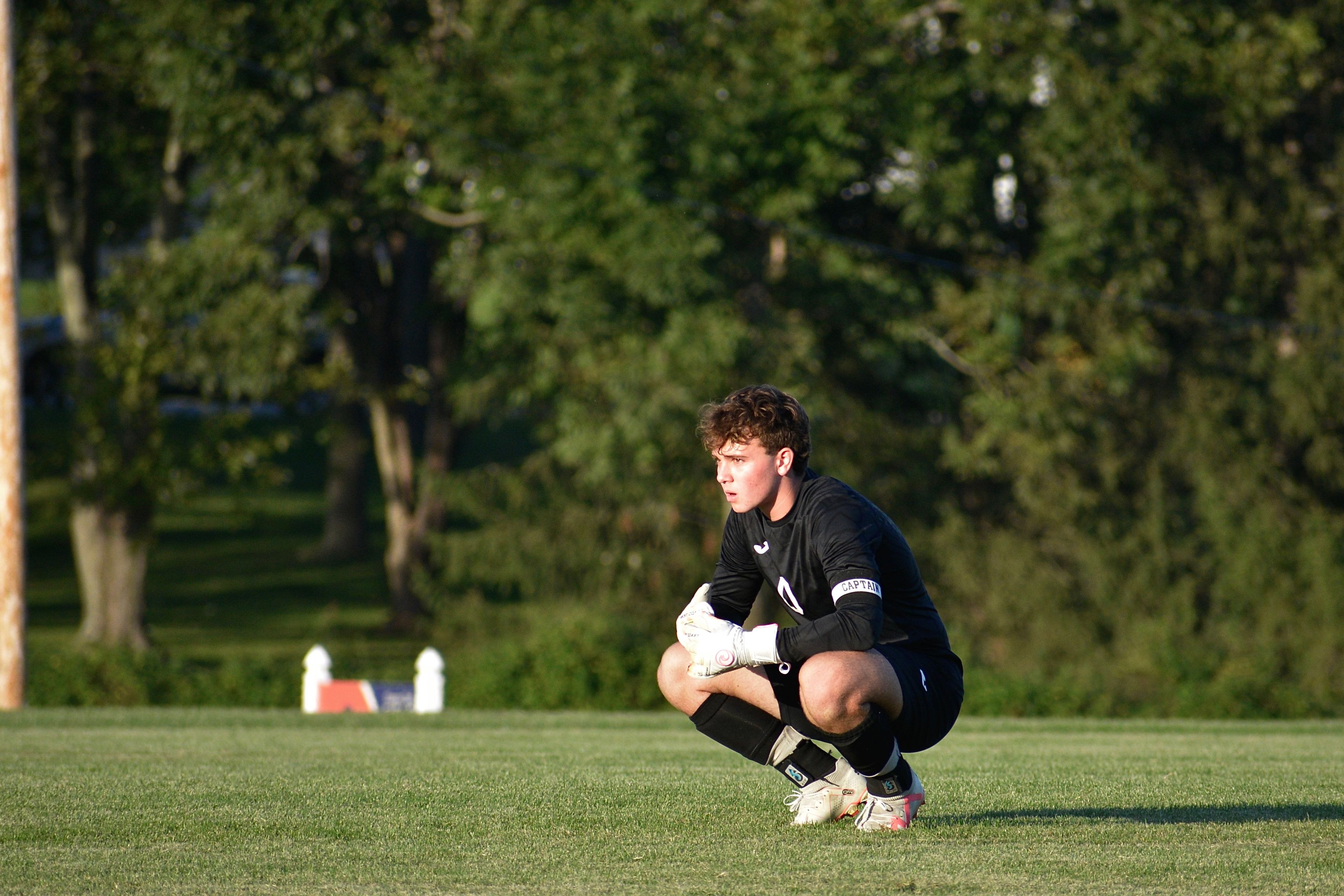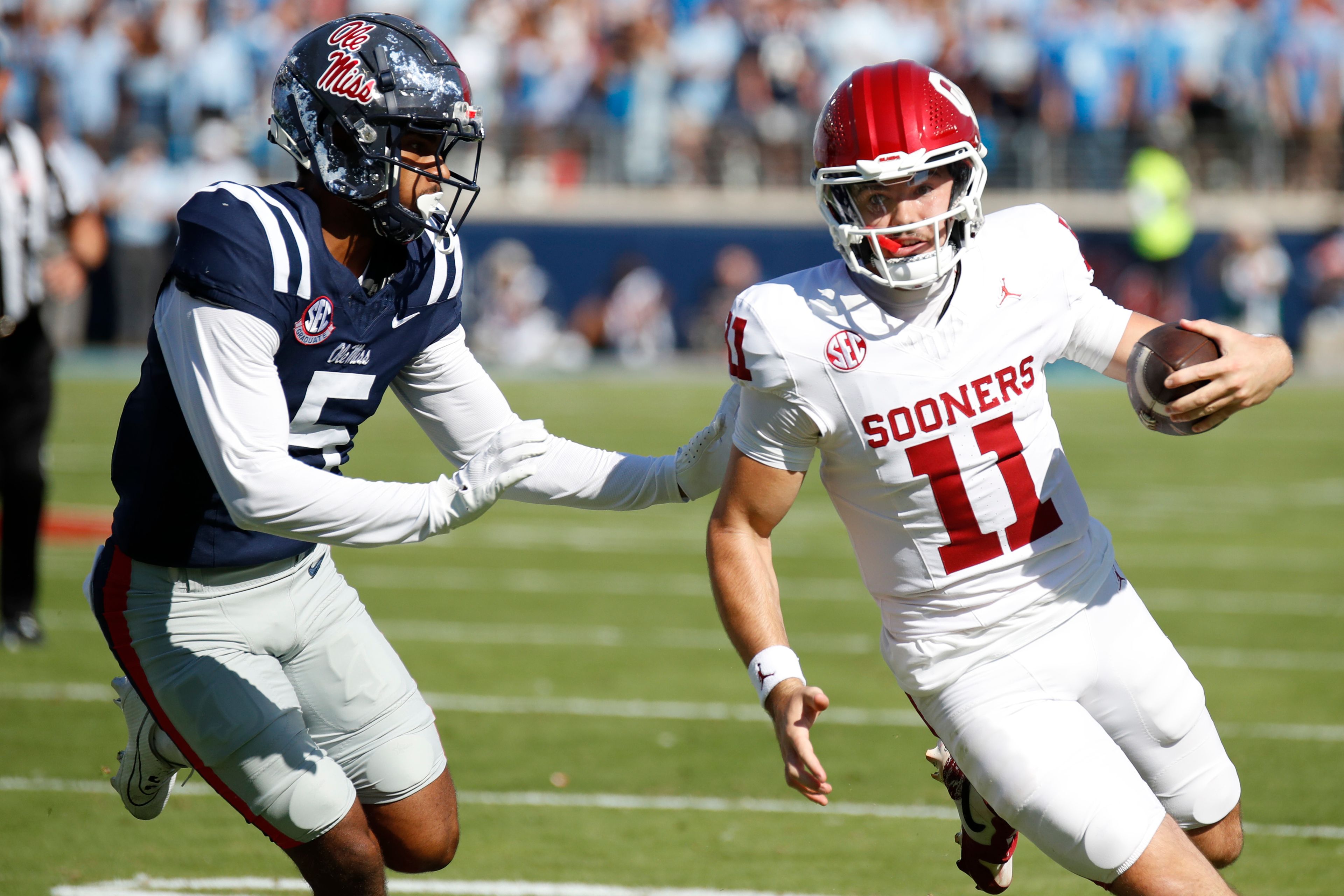Monroe Hicks - Turning the corner
It was there. The laughter, the sincerity, the talent, love, peace and potential. It was always there. But for so long it was clouded by a haze of drugs, alcohol, a broken home and a life on the streets. But Monroe Hicks was there. He was always there...
It was there.
The laughter, the sincerity, the talent, love, peace and potential.
It was always there.
But for so long it was clouded by a haze of drugs, alcohol, a broken home and a life on the streets.
But Monroe Hicks was there. He was always there.
He was just waiting inside, waiting to make a difference, waiting to be somebody.
Hicks, a junior football player at Cape Central High, has moved nine times since he was in first grade. He's been in a foster home and an alternative school. His mother and father, for various reasons, have come and gone throughout his life.
He had nothing going for him other than an athletic body, a competitive spirit and a gentle soul.
When he realized most of his friends were winding up in jail, the branded, tattooed hoodlum decided to offer the world a different face. So he turned himself into one of the best football players in Southeast Missouri. He turned himself into someone he knew his brothers and sister could admire. He turned himself in the right direction.
After years of walking through the shadow of the streets, he now illuminates the lives of many others.
A glimpse of heaven
While the lucky kids in Monroe's first-grade class went home to a home-cooked meal and warm hugs, it wasn't uncommon for Hicks to go home to a house full of drugs and alcohol.
Eventually, Hicks, his four younger brothers and sister were taken away by the state and put into a foster home when Hicks was 6 years old.
Monroe didn't like the foster life. He cried in his bed nearly every night that first-grade year.
I just want to go home, Monroe would mutter to himself as he tried to sleep. I want to be with my mom. I want to be with my cousins. I don't know these people. They're not my parents.
On the last day of school that year, Monroe and his schoolmates were riding home on the bus, talking about their grades.
"Hey, Monroe," a girl asked. "Did you pass?"
"I don't know," Monroe answered.
"Let me see your report card," said the girl, ripping it from his hands. "Monroe! You didn't pass!"
Many of the children on the bus thought it was funny that Monroe didn't even know he had failed first grade. They laughed.
Monroe, embarrassed, said nothing.
Sometime later, Laura James -- Hicks' mother -- regained custody of the children. Things were better for a while, but soon the unhealthy lifestyle crept back into the household.
By Monroe's fourth-grade year, after three years of tough times, he caught a glimpse of what he considered heaven.
For his birthday, he got to spend two days with his grandmother, Bertha James.
He ate wonderful meals and slept well there. Grandma's house was the place to be.
Monroe asked his mother if it would be all right to live with Bertha, and Mom gave the OK.
Now it was time to ask Grandma.
Hicks was nervous. In the back of his mind, he didn't think he'd be allowed. He was scared.
Nervously, he approached Bertha.
"Grandma, can I stay with you?" he asked.
And she said yes.
That was one of the best days of Monroe's life.
Bertha has raised Hicks for most of the time since then. He's moved a couple times, but he always came back to Grandma's open arms.
Hicks to this day feels guilty for leaving his brothers and sister behind. He knows he had a better upbringing than they did and he punishes himself for it.
Bertha did the best she could with Hicks, and he appreciates her willingness to raise a troubled and unruly kid. When all life was breaking loose, when Mom and Dad weren't around, Grandma was there.
In retrospect, Monroe's mother, Laura, believes much of Hicks' rebellious, destructive behavior as a child was the result of anger that he had built up for her.
Laura realizes Hicks had a rough childhood and she knows that her lifestyle back then was the biggest reason for it. She's grateful for Bertha, but most of all she's proud that Hicks has risen above his past.
"He took all the bad stuff I did and changed it around," she said.
Running the streets
Monroe started running the streets in fifth grade.
That year, a friend branded a symbol into his shoulder -- a rectangle with a star inside.
The emblem was to show which gang he belonged to. The kids in south Cape don't call them gangs, but that's basically what they were. Monroe never got involved with that type of activity much, but he had to decide who his friends were or he would be left out completely.
Hicks regrets the life he lived, but he's not ashamed of it. He realizes he wouldn't be who he is without it. But there is still one part of his old life he's proud of -- that brand.
Not the symbol, but the close friend who gave it.
When Jesus Sides, two years older than Hicks, held that lighter up to a pin and proceeded to poke it into Monroe's shoulder, the fifth-grader took it like a man.
Didn't even cry.
Now, the scar is a reminder of Sides, who was shot and killed in Indian Park on a Thursday night last October.
That night, Hicks grieved the loss of an old friend. On Friday night, Hicks had an interception and punt returns of 40, 16 and 39 yards against Sikeston High School.
Hicks had left the street life more than a year before Sides was killed. He had long ago separated himself from his old friends.
But he never forgot.
The tattoos and brands were the beginning of a bad run for Monroe.
He remembers one night on Middle Street when a gun was fired at a car from within inches of his ear. Just as he was turning around, the weapon was fired and he felt sparks hit his face.
Knowing that the situation could get worse, Hicks left immediately. He didn't even think much of it at the time. It was just another night on the streets.
Looking up to brother
Zach James was Central's next great running back.
As a freshman, he was a phenom on the ninth-grade team.
The next year as the 185-pound sophomore rushed for more than 900 yards, James had his entire football career in front of him and his little brother Monroe behind him.
Hicks adored his big brother, wanted to be just like him.
Zach grew up much the same way that Hicks did, although they didn't spend a lot of time together.
But Hicks went to a lot of Zach's football games. When Zach would break off a big run, skinny little Monroe would announce to anyone within earshot:
"That's my brother!"
Then-coach Jerry Dement couldn't believe some of the horror stories from Zach's childhood. Dement wanted to help Zach any way he could. He even let Zach live with him for a time one summer.
But as Dement says, sometimes those things work and sometimes they don't.
Things didn't work out for Zach.
Despite all of his ability, Dement was forced to cut the phenom from the football team his junior year. Zach never completed high school.
Hicks asked Central coach Lawrence Brookins a while back for some of Zach's old game tapes. Hicks watches with wonder how Zach used to dodge, run over and run away from defenders. He sees the talent that could've earned Zach a college scholarship.
One day not too long ago, Hicks saw Zach.
"You know you're going back to get your GED so you can play football," Hicks said.
"Ah, I don't even want to talk about that s
," Zach said.
Hicks badly wishes that his brother would've finished high school. He had big dreams for Zach.
Eventually, Hicks realized if he was going to make something of himself, he couldn't follow the road Zach took. He'd have to take another path.
So he took his own.
More than a thug
The worst of times for Hicks, in terms of behavior, were his middle school and junior high days.
His sixth- and seventh-grade years were particularly unbecoming.
He was suspended from school for 10 days twice and was sent to the alternative school in seventh grade.
His grades were so poor as an eighth-grader, he couldn't play football. He often found himself running from the police.
His grandmother couldn't control him. Bertha did all she could to try to talk sense into Hicks.
"You're not hurting anyone but yourself," she would say. "You're not hurting your teachers, you're not hurting your principals. You're hurting yourself."
It got so bad, Bertha considered not letting him live with her anymore.
There weren't many adults who cared to be in Hicks' company a few years ago. He admits that he let his mouth get him into trouble at school. He didn't respect his teachers or anyone of authority.
Just before ninth grade, he changed.
There wasn't one specific moment that Hicks can point to. It was a culmination of things.
He realized that most of his friends were in jail. He realized he didn't want to run the streets and that he wanted a better life for himself.
But most of all, he realized his five younger siblings needed a role model.
When his four younger brothers and younger sister were taken away again and put into a foster home, that's when he realized it was time to grow up.
It was time to become more than a thug.
So he applied himself.
He started going to church. He started listening in class.
He started working his tail off for football.
He started a new life and made new friends, friends that wouldn't get him into trouble.
Everybody who knew Hicks before and after can't believe the change.
Brett Reutzel, one of Hicks' freshman football coaches, can't talk about him without getting chills.
His new friend, Margaret Yates, tears up.
His coaches just shake their heads.
Now, instead of making trouble, he makes mostly Bs and Cs.
Instead of smarting off to his teachers, he jokes with them.
And instead of running the streets, he's running into the end zone.
A work ethic
On Wednesday, June 27, this summer, Hicks was the first to arrive for weight lifting, 66 days before the first football game of his junior year. He walked 1.5 miles from his house on South Henderson and was ready to go in front of Cape Central's Tiger Field House at 6:45 a.m., 15 minutes early.
Despite having no car, Hicks is always early.
As Central head coach Lawrence Brookins always says, "Early is on time, on time is late and late is don't bother."
Hicks is usually the first player at practice, the first in line to lift and the first in line to run. And he's almost always the last one to leave.
Brookins practically has to chase Hicks out of the weight room.
Passersby have often seen Hicks doing pushups or defensive back drills in his front yard. He's been known to run up and down large hills.
He loves to do pushups. He does them when he gets bored, and you can tell by his bulging triceps. One day he was really bored. He did 700.
At 5-foot-10, 170 pounds, Hicks bench presses more than twice his weight (250) and he squats 375.
Brookins has warned Hicks that he could be working too hard. He's told his junior leader that he needs to rest on his rest days. Often, Hicks pays no attention. He hates being still.
He worked himself into such shape this summer that he complained to assistant coach Darrick Smith that the workouts weren't difficult enough.
On June 27, it didn't appear the other 39 athletes shared his sentiments.
While they were worn out, Hicks wanted more.
When they were done running, he went back to the weight room. He had to work on his calves. And his neck. Just a little more.
Building relationships
Margaret Yates and Hicks didn't get off on the right foot.
The first time they met, he was in eighth grade and Yates was yelling at him for hitting another student just outside her classroom. Yates made him promise that he would never do that again.
Yates didn't see him again until the next year when she was his Family and Consumer Science teacher.
Before long, Hicks went from being a student in her class to a member of her family.
Margaret swears that her family has received far more benefits from Hicks than vice versa.
But the relationship is clearly reciprocal.
Ted Yates, Margaret's husband, is an attorney and there is a son, Pierce, 16, and two daughters -- Meg, 14, and Adeline, 9. They live in an old-style, four-bedroom house on Henderson near Southeast Missouri State University.
Ironically, the Yates family and Hicks live on the same street. But the distance between their dwellings and their positions on the social scale are similar -- miles apart.
Ted has found that Hicks is a polite and shy young man and that he has his own strong convictions when it comes to work ethic and responsibility.
For instance, when Hicks held a summer job at Albertson's grocery store, he would often spend the night at the Yates house and Ted would drive Hicks to work.
By the time Ted woke up, Hicks would already be dressed and have made his bed. Hicks makes his bed every day. His room is always clean, his furniture is polished.
Meg considers Hicks a brother -- and not the slang, street version of the word. She literally loves him like a brother and she's not afraid to admit it.
Hicks calls Ted and Margaret the parents he's never had.
Soon after meeting Hicks, the entire Yates family started going to his games, matches and meets.
Ted and Hicks hit it off at the start.
While Pierce and Meg would go sit by their friends at basketball games, Hicks would often sit next to Ted. They'd talk about everything and the relationship grew.
The gift
Christmas morning 2000 at the Yates house.
Hicks had always wanted a letterman's jacket. He was planning to pay for one himself, he said. Hicks would never ask for something like that. If he can't buy it himself, he won't ask for it.
He might ask his grandma for some money for a haircut or a stick of deodorant, but he'd never ask anyone for an expensive jacket.
Each member of the Yates family pitched in for the perfect gift for one of the hardest working athletes in Southeast Missouri. After all, Hicks earned a varsity letter in three sports as a sophomore, a rare feat at Central High. Hicks also wrestles and runs on the track team.
It was the kind of jacket that most high school athletes wear, at least the ones with enough money. It was decorated handsomely based on the input of the entire family.
Meg is proud that she picked out the Tiger on it.
When he was presented with the big, heavy box, he had a puzzled look on his face. He had no idea what was in the package.
Slowly, methodically, the former tough, macho street kid with brands and tattoos unwrapped the paper.
He looked inside.
Silence.
He kept looking down, into the box.
More silence.
"Well, Monroe, you gonna say something?" Margaret asked.
"I can't talk right now," he said.
And tears rolled down his cheeks.
Hugs and kisses followed.
That was the first time Margaret hugged Monroe. Now they hug all the time.
Looking ahead
Hicks has gotten a lot of support over the last couple of years to help him make his change.
The Yates, his coaches, teachers and new friends have all had an impact on Hicks' life.
But ultimately Hicks made the decision.
Sports made a big difference. He keeps so busy training, running, lifting and playing that he doesn't have a lot of time to get into trouble. But there's more than that. Plenty of athletes have taken to the street life. Hicks needed to look no further than his older brother Zach to see that.
Whatever changed him came from within.
After two older brothers failed to complete high school, Hicks is well on his way to graduating. And he doesn't plan to stop there.
He'll probably get a college scholarship. His coaches think he's good enough to play at a Division I school.
As a sophomore, Hicks was a keystone on a defense that was one of the tops in the area. He earned all-conference and all-region recognition. He might have been the best safety in Southeast Missouri.
Hicks reportedly impressed some college coaches at a football camp this summer at the University of Missouri, and he'll be disappointed if he doesn't make the all-state team this year.
Hicks dreams to one day play in the NFL. It's a long shot that he'll ever play on Sundays, despite his athletic ability. But that won't keep him from trying.
Early this summer, Hicks said he really didn't think about anything else but playing football professionally. Since then, he has been doing some more thinking. If playing football doesn't work out, he might become a coach.
And, though he has a long way to go before this story ends, he shows no signs of reverting to the street kid with a bad attitude. He's seen enough of that life.
He says he'll never go back.
335-6611, extension 127
Connect with the Southeast Missourian Newsroom:
For corrections to this story or other insights for the editor, click here. To submit a letter to the editor, click here. To learn about the Southeast Missourian’s AI Policy, click here.








